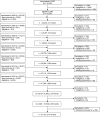Association Between Insomnia Symptoms and Trajectory With the Risk of Stroke in the Health and Retirement Study
- PMID: 37286360
- PMCID: PMC10401688
- DOI: 10.1212/WNL.0000000000207449
Association Between Insomnia Symptoms and Trajectory With the Risk of Stroke in the Health and Retirement Study
Abstract
Background and objectives: Insomnia is a common condition affecting more than a third of the US population. However, the link between insomnia symptoms and stroke is understudied and the underlying mechanism remains unclear. This study aimed to investigate the relationship between insomnia symptoms and the incidence of stroke.
Methods: The Health and Retirement Study, a survey of Americans older than 50 years and their spouses, from 2002 to 2020 was used as the data source. Only those who were stroke-free at baseline were included in this study. The exposure variable was insomnia symptoms and was derived from self-reported sleep-related factors including difficulty initiating sleep, difficulty maintaining sleep, waking up too early, and nonrestorative sleep. Repeated-measures latent class analysis was used to identify insomnia trajectories over time. To investigate the relationship between insomnia symptoms and stroke events reported during the follow-up period, Cox proportional hazards regression models were used. Mediation analyses of comorbidities were performed using causal mediation within a counterfactual framework.
Results: A total of 31,126 participants were included with a mean follow-up of 9 years. The mean age was 61 years (SD = 11.1) and 57% were females. Insomnia symptom trajectories remained constant over time. Compared with those with no insomnia symptoms, an increased risk of stroke was observed for those with insomnia symptom scores ranging from 1 to 4 and 5 to 8 (hazard ratio (HR) = 1.16, 95% confidence interval (CI) 1.02-1.33) and (HR = 1.51, 95% CI 1.29-1.77), respectively, indicating a dose-response relationship. The association was stronger in participants younger than 50 years (HR = 3.84, 95% CI 1.50-9.85) than in those aged 50 years and older (HR = 1.38, 95% CI 1.18-1.62), comparing those with insomnia symptoms ranging from 5 to 8 with those with no insomnia symptoms. This association was mediated by diabetes, hypertension, heart disease, and depression.
Discussion: Insomnia symptoms were associated with an increased risk of stroke, especially in adults younger than 50 years, and the risk was mediated by certain comorbidities. Increased awareness and management of insomnia symptoms may contribute to the prevention of stroke occurrence.
© 2023 American Academy of Neurology.
Conflict of interest statement
The authors report no relevant disclosures. Go to
Figures


References
Publication types
MeSH terms
LinkOut - more resources
Full Text Sources
Medical
